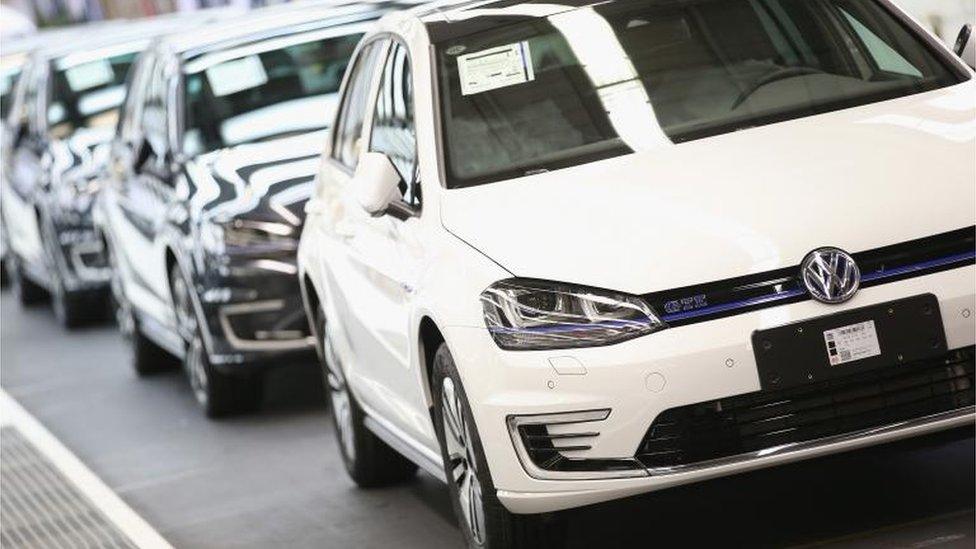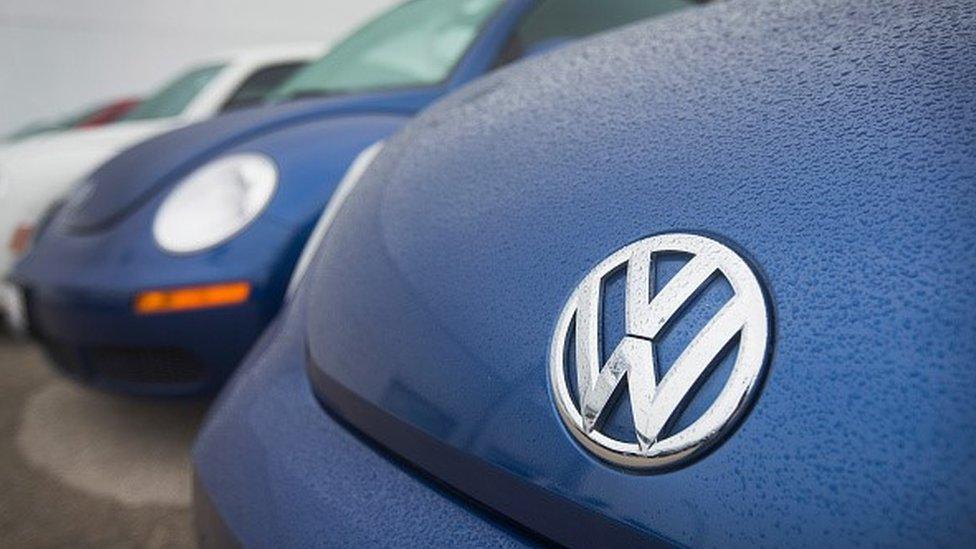Volkswagen pushed into loss by emissions scandal
- Published

Volkswagen has reported its first quarterly loss for at least 15 years after taking a big charge to cover the costs of its emissions scandal.
VW said, external it had set aside €6.7bn ($7.4bn; £4.8bn) to cover the scandal, leaving it with a €2.52bn pre-tax loss for the third quarter of the year.
In September, VW admitted installing software to cheat emissions tests in 11 million of its diesel cars worldwide.
Despite the scandal the company still expects sales to grow this year.
However, VW said it expected profits for the full year to be "down significantly".
'Manageable' burden
In the three months to the end of September, vehicle sales fell 3.7% and production fell 11.6% compared with the same period last year. However, VW said that it was still forecasting a rise of up to 4% in sales revenue for the whole of the year.
The €6.7bn charge is likely to be the first of a raft of costs that the company has to face. Chief financial officer Frank Witter said: "No penalties or fines [or] compensation to customers have been included [in the €6.7bn charge].
"The financial burden is enormous but manageable... but we will emerge stronger and leaner than ever before."

Analysis: Business Correspondent Theo Leggett
For VW, the financial pain is only just beginning. The €6.7bn it has already set aside was enough to turn a healthy third quarter profit into a sizeable loss. But the final bill is likely to be much, much higher.
Firstly, VW has to cover the costs of recalling and modifying 11 million diesel-powered cars. Those costs should be relatively easy to quantify.
But on top of that, it is facing civil penalties, criminal investigations and lawsuits from both customers and investors. The company itself admits it simply doesn't know how much it will eventually have to pay. Outside estimates range from €20bn to €60bn.
So can VW survive the crisis?
The simple answer is yes, it probably can. If you strip away the costs related to the crisis itself, what's left is a strong, profitable business (which happens to be part owned by the regional government of Lower Saxony).
Yes, its brand has been damaged, but the company says sales have not been badly affected so far. There have been repeated apologies from senior managers, a major corporate restructuring and a new emphasis on rebuilding the trust of consumers.
That is a similar strategy to the one pursued by Toyota five years ago, after it admitted lying to regulators and consumers in the US about potentially lethal problems with accelerator pedals. Car buyers in North America did turn away in droves for a while - but they soon returned.
In fact, Toyota is currently the World's largest carmaker by sales, a title it won at the expense of...Volkswagen.

VW said that although sales were down over the past three months, the scandal had had a limited effect. Axel Kalthoff, director of group sales, said: "We do not see that the diesel issue is impacting our sales and order intakes for diesel.
"There might be one or another country or one or another brand, especially in western Europe, that might be affected for the time being on the diesel issue, but at a group level we are fine on order intake."
VW said the legal costs of the scandal "cannot be estimated at the current time". But it added that "considerable financial charges may be incurred as the legal risks crystallize".
In its quarterly report, it outlined the types of litigation it expects to face:
Criminal and civil charges from national regulatory authorities.
Class action or individual civil lawsuits from customers.
Class action or individual civil lawsuits from investors.


At the scene: Emily Young, Wolfsburg
There's an air of defiance about VW's workers in Wolfsburg.
They feel that the reaction to the scandal has been overdone. The environmental damage is nothing compared to BP's Deepwater Horizon oil spill and the cars are still greener than the American gas guzzlers, they say.
Detractors would of course point to the fact that the problem lies more with the behaviour of the company than the impact on the environment.
But if VW is going to successfully navigate this crisis - it will need the backing of its workers. For now, it appears to have that.

Broken trust
Commenting on the latest results, Matthias Mueller, VW's chief executive and chairman of the board of management, said: "The figures show the core strength of the Volkswagen Group on the one hand, while on the other the initial impact of the current situation is becoming clear.
"We will do everything in our power to win back the trust we have lost."
Meanwhile the group has started retrenching and announced earlier this month it would reduce its research and development budget. In the last three months it has reduced R&D by more than €1bn.
VW's shares have fallen some 25% since September when the US Environmental Protection Agency (EPA) found that many VW diesel cars being sold in America had devices that could detect when they were being tested, and artificially improve the results.
The group's chief executive, Martin Winterkorn, said his company had "broken the trust of our customers and the public" and resigned. He was replaced by Mr Mueller, the former boss of Porsche.
Volkswagen shares ended up 2% on Wednesday.